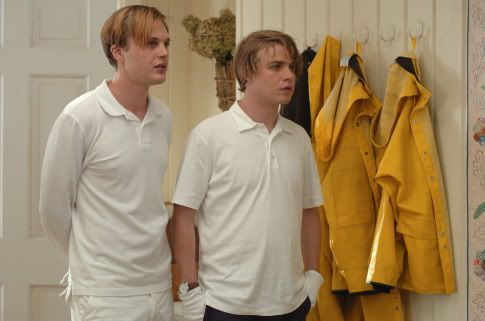 Austrian director Michael Haneke (Hidden) claims that his latest film, Funny Games (a shot-by-shot remake of his own 1997 German-language film) is a commentary on violence and the media, and on the way in which “American cinema toys with human beings… [and] makes violence consumable.” He argues that, through to-camera asides and “emotional episodes” he successfully subverts the genre, and makes the audience complicit in these characters’ violence. According to Haneke, if you see this film through to its conclusion, you’re actually jumping aboard America’s cinematic violence train and tooting its horn. And herein lies the messy contradiction; Haneke is adhering to the very mentality that he so vehemently critiques. Additionally, he hasn’t quite succeeding in obtaining that level of subversion that is necessary to make audiences aware of his message. Funny Games therefore ironically ends up as just another mad thriller, not unlike so many others produced in America.
Austrian director Michael Haneke (Hidden) claims that his latest film, Funny Games (a shot-by-shot remake of his own 1997 German-language film) is a commentary on violence and the media, and on the way in which “American cinema toys with human beings… [and] makes violence consumable.” He argues that, through to-camera asides and “emotional episodes” he successfully subverts the genre, and makes the audience complicit in these characters’ violence. According to Haneke, if you see this film through to its conclusion, you’re actually jumping aboard America’s cinematic violence train and tooting its horn. And herein lies the messy contradiction; Haneke is adhering to the very mentality that he so vehemently critiques. Additionally, he hasn’t quite succeeding in obtaining that level of subversion that is necessary to make audiences aware of his message. Funny Games therefore ironically ends up as just another mad thriller, not unlike so many others produced in America.The film follows the affluent (and very white) Faber family as they arrive at an idyllic riverside holiday home. Annie (Naomi Watts), George (Tim Roth) and their young son Georgie (Devon Gearhart) begin their holiday in high spirits but soon find themselves unnerved by two overly polite yet unnervingly creepy boys who come over from next door, apparently in search of eggs. Dressed in white costumes that seem to eerily recall something of A Clockwork Orange, Paul (Michael Pitt) and Peter (Brady Corbett) make their intentions known soon enough; they find pleasure in psychological torture and gradually pump up the terror levels. Haneke doesn’t show any graphic violence on-screen, but this somehow feels all the more terrifying. Paul occasionally speaks to the camera, and these moments must be those ‘asides’ that Haneke believes subvert the thriller genre, but they’re not nearly great enough in number or effect to achieve anything significant. In the end, Haneke can intellectualise this terror as much as he wants, but that won’t change the fact that this thriller is ugly, terrifying and just as much entwined in the American cinematic apparatus as the next one. And where does that leave Haneke's philosophy?




No comments:
Post a Comment